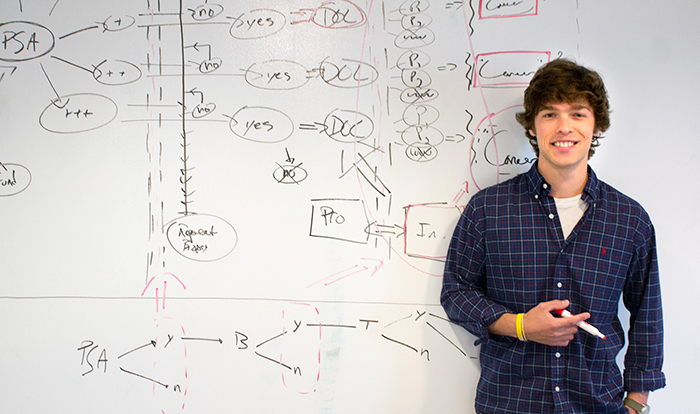
About one in every seven American men will be diagnosed with prostate cancer in their lifetime1. Combatting cancer is difficult, but one crucial step is early detection, which is made possible through screening examinations such as the Prostate Specific Antigen (PSA) test. Philip Parkes ’17 is working with Professor of Biology Herm Lehman on a project titled “The Origins of Over-Testing: Prostate Specific Antigen (PSA) Test” that is sponsored by a Levitt Summer Research Grant.
Although PSA testing had been used for almost a decade as a measure of cancer recovery, it wasn’t until 1994 that the Federal Drug Administration (FDA) approved it as a screening measure. Like breast cancer, prostate cancer cannot be treated after it leaves the organ of origin, part of what makes early detection so critical.
The PSA test measures antigen levels in the blood, correlating higher levels of prostate specific antigen to an increased risk of developing prostate cancer. However, this test only indicates abnormal prostate functioning, it cannot distinguish between cancerous and noncancerous conditions or between malignant and benign cancers. In order to confirm the presence or absence of cancer, it is necessary to have a biopsy, requiring an invasive, and often painful, procedure.
Parkes is completing a comprehensive review of clinical trials of PSA testing from the time it was first proposed in the early 1980s to its present day applications. He was inspired to conduct this independent research after writing a final paper for a course with Associate Professor of Philosophy Katheryn Doran. Parkes, who is pursuing a double major with economics and either philosophy or history, became interested in the ethicality of mass screening and the subsequent over-diagnoses.
He is assessing the effectiveness of PSA testing, considering clinical trials, social attitudes toward cancer, prostate biomarkers and the data from the Dartmouth Atlas. Professor of Economics Stephen Wu will be helping Parkes wade through the immense amount of data in the Atlas, which evaluates regional medicinal practices and aggregates medical statistics.
“What interests me most,” Parkes confessed, “is that an issue like this requires a philosophical solution.” Pondering the value of a life, Parkes weighed the options aloud, “is it worth testing 40-50 men in order to save one life? Or is it more ethical to save those people the physical and psychological impacts of over-diagnosis and -treatment?”
Although Parkes is utilizing many empirical methods, he is also applying his philosophy background to the social side of the issue. He acknowledged the public relationship America has with cancer, promoting walks, runs and fundraisers for the cure. With all the resources being poured into cancer research and awareness, Parkes questioned whether this attitude may actually make people more apprehensive rather than less.
He also revealed the significant income incentives for doctors who prescribe PSA tests and biopsies, not to mention the tendency of doctors to prefer treatment within their field of expertise. Although declining to give any medical advice, Parkes mentioned that one of the best ways to avoid physician biases is to employ “active waiting.” It involves consulting with a variety of doctors in different fields to find the best course of treatment, instead of making a decision based on a singular consultation.
Parkes is enjoying the combination of his interests in history, philosophy, biology and economics to reach an overall opinion on the PSA test. He likes the research and remarked said that he wants “to build a strong basis on the clinical trials, [then conduct tests of specific prostate biomarkers] and add something to the field.”
1 Numbers reflect the estimated US population in 2014. Retrieved from the American Cancer Society at http://www.cancer.org/cancer/prostatecancer/detailedguide/prostate-cancer-key-statistics
Philip Parkes is a graduate of Christian Brothers Academy in Syracuse, N.Y.
